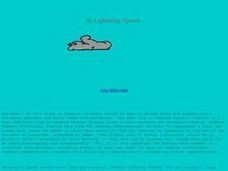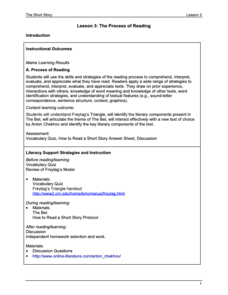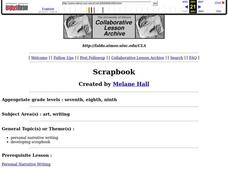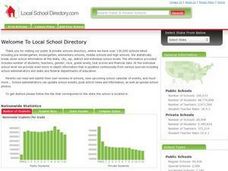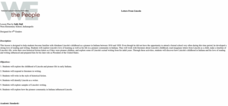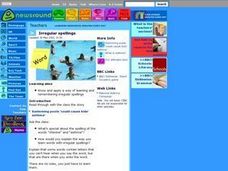Curated OER
Base Words and Prefixes
Once your second graders grasp base words and prefixes, challenge them with this visual word meaning activity. They watch you model it before engaging in guided practice. Use these word cards focused on the prefix re to help your...
Curated OER
At Lightning Speed
Review how to decode words and practice repeated readings for fluency. Kids review the cover-up method as a way to decode unknown words and then practice reading sentences for fluency and short passages with partners. They record their...
Curated OER
VCe Rule Accuracy
Explore word structure by participating in a vowels and consonants activity with young readers. They will read words their teacher points out in class and pronounce them correctly. Then they identify the words they say which have a...
Curated OER
The Very Hungry Caterpillar
Learners complete various activities related to the book "The Very Hungry Caterpillar." They participate in a shared reading activity, read and write a sentence for each day of the week, draw a picture of the caterpillar eating one of...
Futures Channel
Algebra Magic
Abracadabra! Letters can be used in math to represent numbers with the operations of addition, subtraction, multiplication, and division to solve problems! Math magicians will participate in an activity that uses a calculator and a bag...
Curated OER
Ann Arbor Growth & Immigration
Third graders describe some of the factors that brought early settlers to Ann Arbor. They read Narrative-A Trip from Utica, New York, to Ingham County, Michigan in 1838. As an added challenge, 3rd graders can use maps to track Silas...
Curated OER
Before, During, and After Strategies For The Catcher in the Rye Chapters 21-23
Create a personal website for Phoebe. Play a song dealing with non-conformity. Have class members write an advice letter to Holden. Here's a teacher resource meant to accompany The Catcher in the Rye that is chock-full of strategies. It...
Curated OER
Plankton Parade
Plankton isn't just a tiny cartoon character, it's also a very important food source for animals around the world. Budding scientists discuss the types and functions of plankton, including where they are found, how they are caught, and...
Maine Content Literacy Project
The Process of Reading vocabulary, literary elements
Cover Freytag's Triangle and examine Anton Chekhov's "The Bet" in this third lesson plan in a series of fourteen based around short stories. Learners take a quiz and discuss Freytag's triangle. They apply the triangle to "The Bet" and...
Curated OER
Our Glittery Growing Garden!
Young scholars answer a series of questions about the letter G. They practice the sound that G makes and trace a letter G. They decorate their letter G with glue and glitter. They listen to a story about Plainting a Rainbow.
Curated OER
Scrapbook
Students, using photos as their inspiration, develop six personal narratives, then edit and revise them.
Curated OER
Literal Meaning of Reading
Students demonstrate literal meaning of a fiction book. In this reading comprehension instructional activity, students listen to the book, If You Give a Mouse a Muffin and practice the "m" sound during the read aloud. Students answer...
Curated OER
The Panama Canal, The World's Most Important Shortcut
Pupils, through teacher lecture and online activities, study the Panama Canal. They discuss how it was made and the hardships the workers encountered while building it. Through the eyes of one of these workers, they write a short letter...
Curated OER
Unscramble the Letters - Music Terms
Young scholars receive a worksheet on music terms. As a class, they unscramble a couple before attempt them on their own. They then write the meaning of each to research the meaning of the musical terms.
Curated OER
Letters from Lincoln
Fourth graders explore the childhood of Lincoln and pioneer life in early Indiana. Students respond to literature and write a story using historical fiction. Students explore the writings of President Lincoln and the pioneer community...
Curated OER
Autobiographical Writing
Second graders explore, examine and study the style of autobiographical writing and the relationship with the author. They rad three different types of autobiographical writings: narrative, poetry and newspaper article. Each student...
Curated OER
Swimmy Swim Swiftly
Students examine the letter 's'. Through instruction and modeling they explore the sound the letter makes, how the letter is written, words that contain the letter, etc. They listen to a story and identify words with the /s/ sound by...
Curated OER
The Carlyle House and Gadsby Tavern
Fourth graders tour the Carlyle House and Gadsby Tavern while working on worksheets covering both places. They are to write an essay and thank you notes to finish the instructional activity.
Curated OER
Feelings From A to Z
Third graders create a class A to Z Feelings book to explore emotions, discover new words, pose for a "feeling" icture, and write about the feeling.
Curated OER
Who's in the Shed?
Second graders examine the cover of the book, WHO'S IN THE SHED? and talk about the animals portrayed and the noises they make. They then read the book as a class, looking through the peepholes and making predictions.
Curated OER
Scribbleboy
Fifth graders are introduced to the text, SCRIBBLEBOY, discussing the cover page for clues to the genre. They discuss the ordinary surroundings contrasted by the graffiti and the words and phrases used to provide information about the...
Curated OER
Irregular Spellings
Students know and apply a way of learning and remembering irregular spellings. Students show where irregular spellings can be found everywhere in our society today. Students tie in irregular spellings to silent letters as well.
Curated OER
The Big Sneeze
Students participate in a variety of shared reading and writing activities related to the book "The Big Sneeze" by Ruth Brown. They develop a list of farm vocabulary, sequence the events of the story on a graphic organizer, act out...
Curated OER
University of the State of New York: Grade 4 Science Test
In this New York University grade 4 science test, 4th graders complete 40 multiple choice questions covering a wide range of grade 4 science concepts.



